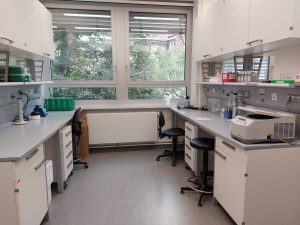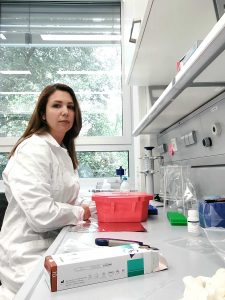We have a new PhD student, Marula Mathew, who is strengthening the wetlab site of our team. Welcome Marula!
Laura started as new PhD student
Laura Schmidt joined our team to work on gene regulatory factors with human specific changes. She will use primate iPSC to comparatively investigate how such factors might have contributed to unique pathways and expression patterns during human brain development.
Talk at Berlin Brains
On February 24th 2022 we gave a talk about our work for the general public at the Urania in Berlin. More than 100 people joined online and about 50 people had been in the auditorium. The talk is now available online and also here.
Title and abstract of our talk (in German):
Evolution des menschlichen Gehirns: Wie aus genetischen Änderungen kognitive Leistungen werden
Im Lauf der Evolution wurden menschliche Gehirne immer leistungsfähiger. Doch welche genetischen Änderungen führten dazu? Und wie testet man, ob und wie eine genetische Änderung kognitive Fähigkeiten ändert? Katja Nowick und Jeong-Eun Lee berichten, wie ihre Arbeitsgruppe mit bioinformatischen Methoden Gensequenzen findet, die spezifisch bei Menschen sind und für die Evolution unseres Gehirns relevant. Sie berichten, wie sie derartige Gensequenzen im Labor auf ihre Funktion hin testen.
TEKRABber R package in Bioconductor
Yao-Chung has developed an R package called TEKRABber to compare relationships between transposable elements (TEs) and genes between species. It is now available from Bioconductor:https://bioconductor.org/packages/3.15/bioc/html/TEKRABber.html.
Using RNA-Seq data, the package is normalizing expression values for genes and TEs across species and calculates correlations between TEs and genes. These correlations can then be compared between species to detect potential evolutionary differences in TE regulation and/or TEs influence on gene expression.
The name of the package derived from the idea that TEs are often repressed by KRAB-ZNF proteins.
Starting our wetlab
Finally: After waiting for more than four years, we can start our first work in our brand new wetlab!


Paper on Evolution of Gene Regulatory Factors in primates
Because evolutionary changes in gene regulatory factors (GRFs), such as transcription factors, can have a big impact on changing the phenotype between species, we set out to test all human GRFs proteins for positive selection within primates. Using information from 27 publicly available primate genomes we especially focused on the human lineage. From more than 3,000 human GRFs, we revealed with high confidence five GRFs that have been positively selected on the human lineage and one GRF that has been positively selected on the great ape lineage. Since each positively selected GRF contains several sites with evidence for positive selection, we suggest that these GRFs participated pleiotropically to phenotypic adaptations in humans.
Vladimir M. Jovanovic, Melanie Sarfert, Carlos S. Reyna-Blanco, Henrike Indrischek, Dulce I. Valdivia, Ekaterina Shelest, and Katja Nowick
Paper on evolution of tissue specifically expressed genes is out
In an international collaboration we investigated the evolution of tissue-specific genes in the Lacerta viridis complex (European green lizard). We had sequenced and analyzed the genomes of three species/lineages and detected gene flow between the Adriatic lineage and L. viridis, suggesting that the evolutionary history of the L. viridis complex is likely shaped by gene flow. Genes highly expressed in the ovaries experienced accelerated evolution presumably contributing to establishing reproductive isolation in the Lacerta viridis complex. In addition, we built co-expression networks and found that genes that are strongly co-expressed in the brain also show accelerated evolution, potentially pointing to the evolution of behavioral differences between the species. Such accelerated evolution of tissue-specific genes might allow for speciation amidst gene flow in European green lizards.
In the newspaper
We have been featured in the German newspaper Tagesspiegel.
Here is the English translation of that article.
CoDiNA paper accepted
Our paper about CoDiNA, a method for comparing coexpression networks, has been accepted for publication by PLoS One. To our knowledge, it is the first method that allows for a comparison of transcriptome-wide networks and of as many networks as you wish. It can be applied to a diverse range of research questions, for instance to comparing coexpression networks, gene regulatory networks, abundance networks, and other types of networks. Networks can be compared between cell-types, tissues, species, or time-points, among others. Just let your imagination play. You will get as output information on which links are conserved across the networks you compare and which links have changed, either by being present in only a subset of networks or by having changed in their sign in some networks. Further, nodes are classified as conserved, specific or diverged between networks.
The development of CoDiNA was a big collaborative effort with most contributions from Eivind Almaas and Deisy Gysi. CoDiNA is implemented as an R package.
Yao-Chung arrived in Berlin
Yao-Chung is finally present in Berlin. Welcome Yao-Chung!
